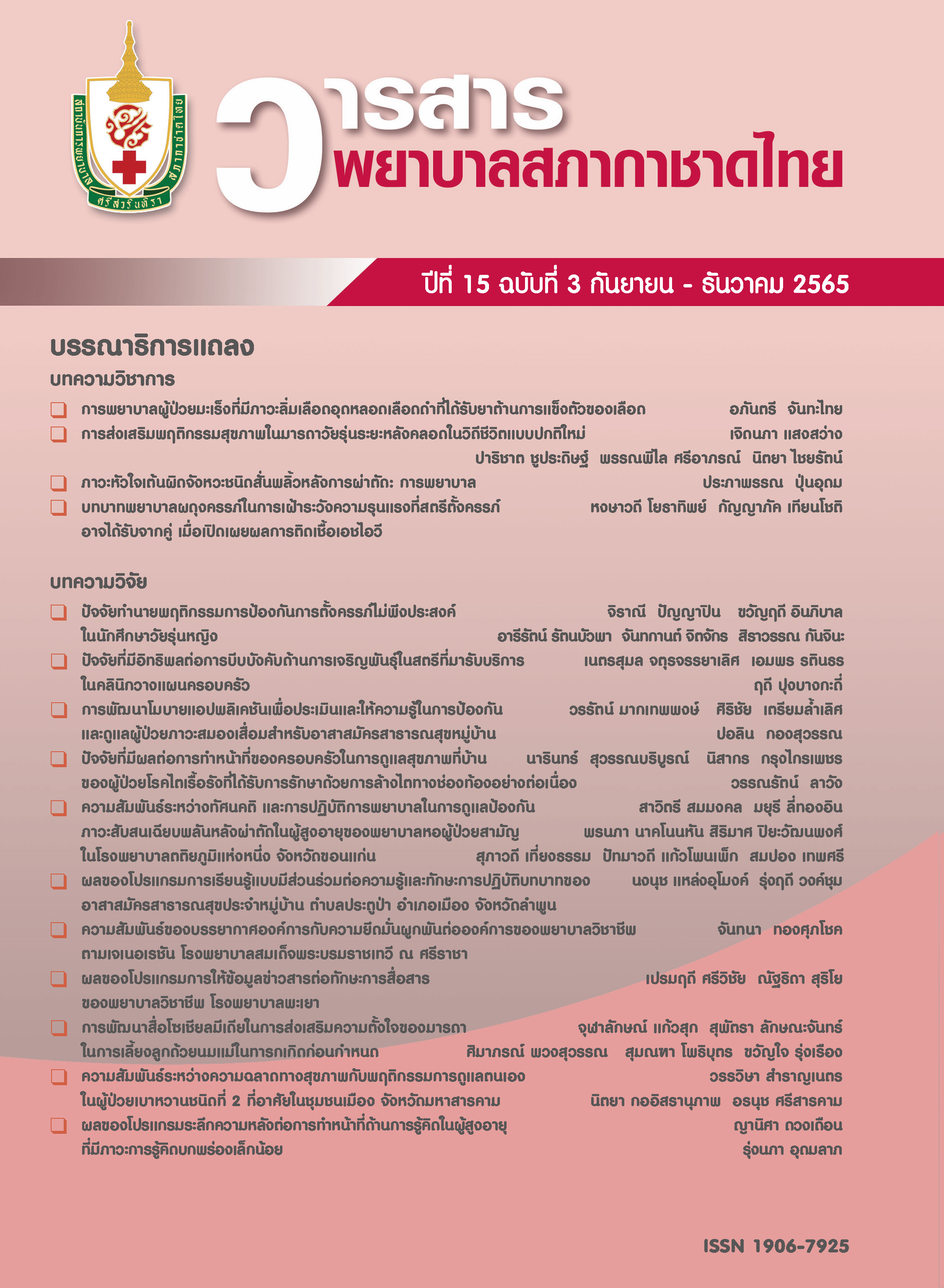Factors Influencing Reproductive Coercion Among Women Seeking Care at Family Planning Clinics
Keywords:
contraceptive self - efficacy, attitudes toward gender roles, reproductive coercion, family planning clinicAbstract
This predictive research aimed to investigate the influence of age, education level, couples’ relationship status, primary source of income, contraceptive self - efficacy, attitudes toward gender roles, and age difference between couple on reproductive coercion. The sample consisted of 250 women aged 18 years and over who attended a family planning and reproductive health services clinic in a tertiary hospital in Bangkok. The data were collected using demographic questionnaires, contraceptive self - efficacy questionnaires, attitudes toward gender roles questionnaires, and reproductive coercion questionnaires. Multiple logistic regression was used for data analysis.
The results indicated that 40.40% of the participants had experienced reproductive coercion. The results showed that only three significant predictors, including education level (aOR 2.93; 95% CI = 1.31 - 6.56, p = .009), contraceptive self - efficacy (aOR = .92; 95% CI = .86 - .99, p = .041), and attitudes toward gender roles (aOR = 1.04; 95% CI = 1.01 - 1.07, p = .009). For the other variables, age, couples’ relationship status, primary source of incomes, and age difference between couple, showed no significant effects on reproductive coercion. Therefore, it is recommended that nurses should be aware that women may experience reproductive coercion. As such, there should be screening for the risk of reproductive coercion and a program to prevent reproductive coercion through the promotion of contraceptive self - efficacy and through fostering gender equality attitudes.
References
Grace KT, Fleming C. A systematic review of reproductive coercion in international settings. World Med Health Policy 2016;8(4):382-408.
Clark LE, Allen RH, Goyal V, Raker C, Gottlieb AS. Reproductive coercion and co-occurring intimate partner violence in obstetrics and gynecology patients. Am J Obstet Gynecol 2014;210(1):42.e1-8. doi: 10.1016/j.ajog.2013.09.019
Miller E, McCauley HL, Tancredi DJ, Decker MR, Anderson H, Silverman JG. Recent reproductive coercion and unintended pregnancy among female family planning clients. Contraception 2014;89(2):122-8.
Holliday CN, McCauley HL, Silverman JG, Ricci E, Decker MR, Tancredi DJ, et al. Racial/Ethnic differences in women’s experiences of reproductive coercion, Intimate partner violence, and unintended pregnancy. J Womens Health 2017;26(8):828-35.
Northridge JL, Silver EJ, Talib HJ, Coupey SM. Reproductive coercion in high school-aged girls: associations with reproductive health risk and intimate partner violence. J Pediatr Adolesc Gynecol 2017;30(6):603-8.
Falb KL, Annan J, Kpebo D, Gupta J. Reproductive coercion and intimate partner violence among rural women in Cote d’Ivoire: a cross-sectional study. Afr J Reprod Health 2014;18(4):61-9.
Hill AL, Jones KA, McCauley HL, Tancredi DJ, Silverman JG, Miller E. Reproductive coercion and relationship abuse among adolescents and young women seeking care at school health centers. Obstet Gynecol 2019;134(2):351-9.
Capasso A, DiClemente RJ, Wingood GM. Pregnancy coercion as a risk factor for HIV and other sexually transmitted infections among young African American women. J Acquir Immune Defic Syndr 2019;82:S155-S61.
Katz J, Poleshuck EL, Beach B, Olin R. Reproductive coercion by male sexual partners: associations with partner violence and college women’s sexual health. J Interpers Violence 2017;32(21):3301-20.
Ribeiro MRC, Silva AAMD, Schraiber LB, Murray J, Alves MTSSBE, Batista RFL, et al. Inversion of traditional gender roles and intimate partner violence against pregnant women. Cad Saude Publica 2020;36(5): e00113919. doi: 10.1590/0102-311x00113919
Connell R, Pearse R. Gender: in world perspective. 3rd ed. Cambridge: Polity Press; 2015.
Rosenbaum JE, Zenilman J, Rose E, Wingood G, DiClemente R. Predicting unprotected sex and unplanned pregnancy among urban African-American adolescent girls using the theory of gender and power. J Urban Health 2016;93(3):493-510.
Moore AM, Frohwirth L, Miller E. Male reproductive control of women who have experienced intimate partner violence in the United States. Soc Sci Med 2010;70(11): 1737-44.
Sinha A, Ram F. Formation of traditional gender attitudes among young married women in rural North Dinajpur, West Bengal: Does religion play a role?. JPSS 2018;26(2):83-100.
Chuemchit M, Chernkwanma S, Rugkua R, Daengthern L, Abdullakasim P, Wieringa SE. Prevalence of intimate partner violence in Thailand. J Fam Violence 2018;33(5): 315-23.
Thananowan N. Prevalence and factors related to intimate partner violence among gynecology patients. J Nurs Sci 2013;31(3):37-47. (in Thai)
Prata N, Bell S, Fraser A, Carvalho A, Neves I, Nieto-Andrade B. Partner support for family planning and modern contraceptive use in Luanda, Angola. Afr J Reprod Health 2017;21(2):35-48.
García-Cueto E, Rodríguez-Díaz F, Bringas Molleda C, Borrego J, Paíno Quesada S, Rodríguez-Franco L. Development of the Gender Role Attitudes Scale (GRAS) amongst young Spanish people. Int J Clin Health Psychol 2014;15(1):61-8.
Miller E, Decker MR, McCauley HL, Tancredi DJ, Levenson RR, Waldman J, et al. Pregnancy coercion, intimate partner violence and unintended pregnancy. Contraception 2010;81(4):316-22.
Phillips SJ, Bennett AH, Hacker MR, Gold M. Reproductive coercion: an under-recognized challenge for primary care patients. Fam Pract 2016;33(3):286-9.
Rungreangkulkij S, Kotnara I, Rujiraprasert N, Khuandee N. Gender inequality identified as an underlying cause of depression in Thai women. J Int Women’s Stud 2019;20(7): 395-406.
Khar A. The role of female education on intimate partner violence in households of Pakistan [Thesis]. Ann Arbor, Michigan: Georgetown University; 2017.
Grace KT, Perrin NA, Clough A, Miller E, Glass NE. Correlates of reproductive coercion among college women in abusive relationships: baseline data from the college safety study. J Am Coll Health 2022,70(4):1204-211. doi: 10.1080/07448481.2020.1790570
Kanjanakuntorn P, Chaiumporn S. Thai family relation models in the globalization era. Journal of Social Development 2019;21(2):164-75. (in Thai)
Downloads
Published
Issue
Section
License
Copyright (c) 2023 Srisavarindhira Thai Red Cross Institute of Nursing

This work is licensed under a Creative Commons Attribution-NonCommercial-NoDerivatives 4.0 International License.
เนื้อหาบทความหรือข้อคิดเห็นต่างๆ ในวารสารพยาบาลสภากาชาดไทยนี้ เป็นความคิดเห็นของผู้เขียนบทความ ไม่ใช่ความเห็นของกองบรรณาธิการ หรือสถาบันการพยาบาลศรีสวรินทิรา สภากาชาดไทย






